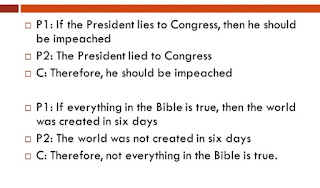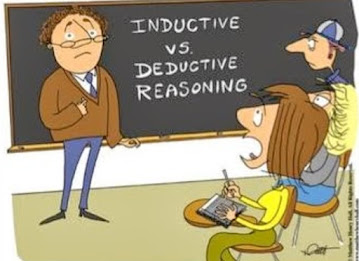Introduction to Arguments
Introduction to logic?
The science of correctness or incorrectness of reasoning,the study of the evaluation of argument. There is no universal agreement as to the exact definition or boundaries of logic.However, the scope of logic includes:
- The classification of arguments.
- The systematic analysis of logical form.
- The systematic study of the validity of deductive inferences.
- The strength of inductive inferences.
- The study of faulty arguments, such as fallacies.
- The study of logical paradoxes.
- The study of syntax and semantics of formal languages.
- The study of the concepts of meaning,denotation and truth.
What is an argument?
In philosophy, an argument is a connected series of statements, including at least one premise, intended to demonstrate that another statement,the conclusion, is true.
Valid argument
The task of an argument is to provide statements that give evidence for the conclusion.The argument has logical strength,or validity.Validity is about the form of the argument,not the truth of its premises.Valid argument may have;
>True premises,true conclusion
>False premises,false conclusion
>False premises,true conclusion
Valid argument can never have;
>True premises,false conclusion
It is important just because an argument does have a possibly valid combination of premises-conclusion truth values.
Premise
To understand what a premise is in philosophy, it helps to understand how the field defines an argument, says professor Joshua May, In philosophy, an argument is not concerned with disputes among people; it is a set of propositions that contain premises offered to support a conclusion.
Conclusion
A conclusion is the statement that is inferred from the argument’s premises. It is a reasoning method in which a conclusion is true if the premises are true.The conclusion is also true when an argument is valid even the premises are false.
Example arguments
Reasoning
Reason is the capacity of consciously applying logic to seek truth and draw conclusions from new or existing information. Reasoning is associated with the acts of thinking and cognition, and involves using one's intellect. The field of logic studies the ways in which humans can use formal reasoning to produce logically valid arguments. Reasoning may be subdivided into forms deductive reasoning and inductive reasoning.
Deductive reasoning
Deductive reasoning is the kind of reasoning in which, roughly, the truth of the input propositions (the premises) logically guarantees the truth of the output proposition (the conclusion), provided that no mistake has been made in the reasoning. The premises may be propositions that the reasoner believes or assumptions that the reasoner is exploring. Deductive reasoning contrasts with inductive reasoning, the kind of reasoning in which the truth of the premises need not guarantee the truth of the conclusion.
Inductive reasoning
Inductive reasoning is a method of reasoning in which the premises are viewed as supplying some evidence, but not full assurance, of the truth of the conclusion.It is also described as a method where one's experiences and observations, including what is learned from others, are synthesized to come up with a general truth. Many dictionaries define inductive reasoning as the derivation of general principles from specific observations, although there are many inductive arguments that do not have that form.







Comments
Post a Comment